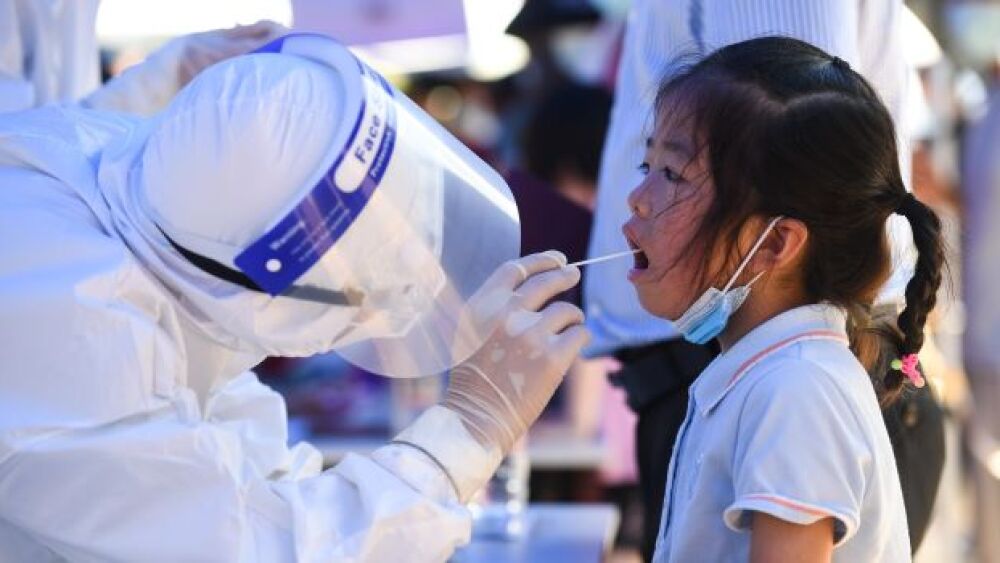Pfizer has launched a Phase II/III study to assess its oral antiviral Paxlovid in non-hospitalized symptomatic pediatric patients who are at risk for progression to serious disease.
Courtesy of Ji Chunpeng Xinhua/Getty Images
Pfizer has launched a Phase II/III study to assess its oral antiviral Paxlovid in non-hospitalized symptomatic pediatric patients who are at risk for progression to serious disease.
Paxlovid is currently authorized by the U.S. Food and Drug Administration (FDA) for use in high-risk adults and high-risk pediatric patients over the age of 12 to combat COVID-19. In the EPIC-PEDS study, the company hopes to replicate the efficacy Paxlovid showed in its previous study. In the EPIC-HR study, Paxlovid reduced the risk of hospitalization or death from any cause by 89% within three days of patients expressing symptoms and 88% within five days of the onset of symptoms.
Mikael Dolsten, chief scientific officer and president of worldwide research, development and medical at Pfizer noted that more than 11 million children under the age of 18 have been diagnosed with COVID-19 in the United States since the beginning of the pandemic. That number represents about 18% of total reported cases in the nation and has led to more than 100,000 admissions to the hospital. Dolsten said there is a significant unmet need for outpatient treatments for children and adolescents to prevent the worsening of their COVID-19 symptoms.
“Paxlovid is already authorized or approved in many countries around the world, with more than 1.5 million treatment courses delivered thus far and 30 million expected by July to help combat this devastating disease. We are proud to expand studies of our novel COVID-19 treatment to include pediatric participants to further evaluate the safety and efficacy of this treatment in this important population,” Dolsten said in a statement.
The Phase II/II study will include 140 pediatric patients who will be divided into different cohorts to test different dose levels of the antiviral. Pfizer said it is also working to develop a dosing regimen for children under the age of 6.
In other COVID-19 news:
Free Antivirals Begin this Week
In his State of the Union Address, President Joe Biden announced a new strategy to mitigate spread of COVID-19 that includes free antiviral treatments from Pfizer and Merck that have been acquired by the government. Beginning this week, following a diagnosis of COVID-19, some patients will begin to receive a free regimen of oral medications from their pharmacies. The initiative, dubbed “Test to Treat,” allows people to receive a rapid COVID test at their pharmacy, and if they are positive, they can receive the medications at no cost on the spot. As NPR reported this morning, the Test to Treat program aims to get the drugs into the hands of high-risk patients so they can begin treatment and prevent a worsening of disease. However, the program is hampered by the requirement for pharmacies to have a prescribing attendant on site.
Another Booster?
In an interview with Bloomberg, Pfizer Chief Executive Officer Albert Bourla said the company intends to submit new data to the U.S. FDA for a potential fourth shot of its COVID-19 vaccine. The company is assessing the fourth shot of its currently-available vaccine, as well as a new formulation that is designed to provide protection against multiple known variants. He said the goal is to “always stay ahead of the virus.”
WHO Calls For Boosters
The World Health Organization is calling for booster doses of the available vaccines in order to prevent further spread of COVID-19. The agency has reversed a previous position that said the additional doses were not necessary for healthy individuals. The global health agency said vaccination, including the use of boosters, was especially important for people at risk of severe disease, the Associated Press reported.
Masking Helped Lower Spread, CDC Study Says
As mask mandates are dropping across the United States due to the reduced spread of COVID-19, the U.S. Centers for Disease Control announced results from a study that said the mandates helped prevent the spread of disease among children while they were in close proximity to classmates at school. Data from the study that looked at public schools in Arkansas showed that schools with full mask requirements had a 23% lower spread of infection among students and staff compared to those districts without the mandates.
Long COVID Study Assesses Viral Effect on the Heart
Long COVID has become an increased concern as individuals who have been diagnosed with the disease are now showing increased cardiac issues. Researchers at The Gladstone Institute in California are using lab-grown heart cells to observe signs of distress following COVID infection. The research is also providing insights into how the virus can damage other organs in the body.
Featured Jobs on BioSpace





